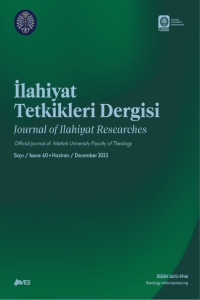Emine Enise Yakar, İslam Hukuku ve Toplum: İfta Uygulaması ve Dini Kurumlar(London & New York: Routledge, 2022)
Emine Enise Yakar’s Islamic Law and Society: The Practice of Iftā’ and Religious Institutions (London & New York: Routledge, 2022)
Author(s): Sümeyra YakarSubject(s): Islam studies, Government/Political systems, Politics and society, Book-Review, Sociology of Religion
Published by: Atatürk Üniversitesi İlahiyat Fakültesi
Keywords: Fatwā; Dâru’l-İftâ; Fiqh Council of North America (FCNA); The General Presidency of Religious Affairs (DIB);
Summary/Abstract: In Islamic Law and Society: The Practice of Iftā’ and Religious Institutions, Emine Enise Yakar explores critical aspects about the methodological pluralistic structure of fatwās in different societies and the approaches of three fatwā institutions: Saudi Arabia’s Dār al-Iftā’ (The General Presidency of Scholarly Research and Iftā’), Turkey’s Diyanet (The General Presidency of Religious Affairs), and the Fiqh Council of North America (FCNA) in America. The book brings together diverse theoretical discussions and practical examples that offer a comparative analysis of contextual factors and the attitudes of scholars to provide solutions that are applicable in their relevant societies. The central theme of the book scrutinizes the methodological diversities of the institutions; the contextual and dynamic complexities regarding the approaches of scholars living in Saudi Arabia, Turkey, and America; and the underlying influences regarding madhhab (school of law) affiliation, social values, cultural practices, and legal and political systems over the institutions’ fatwās. Underscoring the role of fatwā institutions in the contemporary world, the book is composed of five detailed chapters. In the introductory part, Yakar provides an eloquent synopsis regarding the chronological alteration in the nature of fatwā from individual to collective, enlightens the readers regarding the selection criteria of these institutions, and mentions the idiosyncratic characters of Saudi Arabia, Turkey, and America from a religio-legal perspective. The main strengths of the book are its comprehensible representation of an accessible anthology regarding comparative fatwās, its clear focus on religious institutions, and its potential to broaden the readers’ minds with respect to the intellectual diversity of scholastic debates over the solutions to modern problems.
Journal: İlahiyat Tetkikleri Dergisi
- Issue Year: 2023
- Issue No: 60
- Page Range: 149-152
- Page Count: 4
- Language: Turkish

